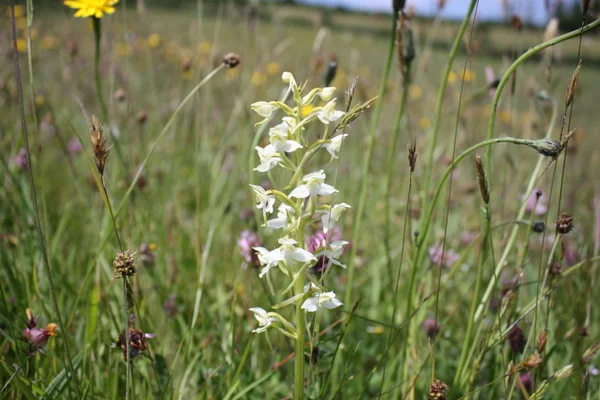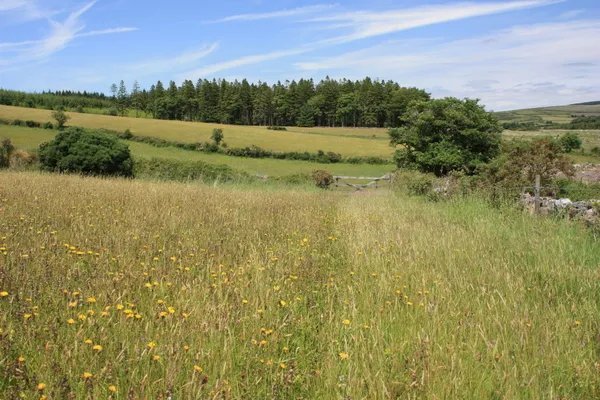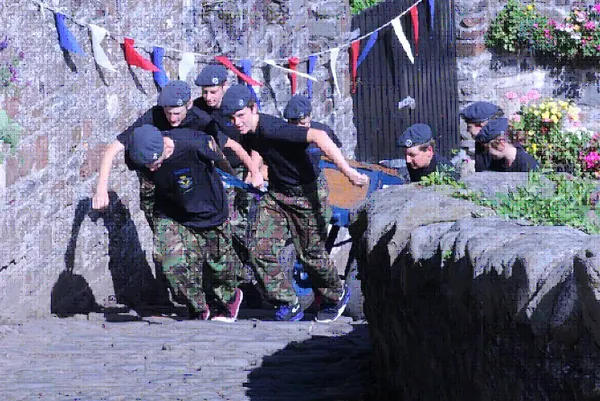70 hectares of wildlife-rich land close to one of Dartmoor's most popular recreation
sites is set to become a brand new nature reserve thanks to a partnership between
Devon Wildlife Trust and the Forestry Commission.
The nature reserve, which is to be called Bellever Moor and Meadow, is owned by the
Forestry Commission and is close to the moorland village of Postbridge and the
well-known Bellever Forest picnic site. The land, which is made up of a patchwork of
traditional hay-meadows, wet grassland and moorland, is set to become the latest of
nearly 50 nature reserves cared for by local charity, the Devon Wildlife Trust.
Bellever Moor and Meadow has been leased to Devon Wildlife Trust by the Forestry
Commission under a 25 year management agreement. The Forestry Commission identified
the opportunity for the land to be managed more effectively for wildlife and
approached Devon Wildlife Trust to propose the partnership agreement. It will be
open to the public to explore and enjoy for free, 365 days a year. And like all of
Devon Wildlife Trust's nature reserves, it will be managed as a haven for local
wildlife.
Devon Wildlife Trust's Nature Reserves Manager, Matt Boydell, was part of the team that worked with the Forestry Commission to agree the lease. He said: "Bellever Moor and Meadow is a stunning site and provides a wonderful opportunity for Devon Wildlife Trust to become more actively involved in the very heart of Dartmoor. The nature reserve also gives us a chance to put the skills we've gained over the last 20 years in restoring and re-creating grassland to use on Dartmoor in the restoration of nationally rare upland hay meadows."
Robert Harris, Land Agent at the Forestry Commission said: "We are delighted that Devon Wildlife Trust agreed to take on the management of this area and look forward to working with them. We will continue to manage Bellever Forest, which is also rich with wildlife as well as archaeological features, so the whole area will be managed effectively as part of the wider Dartmoor landscape." It will be the job of Devon Wildlife Trust Nature Reserve officer Ian Chadwick to look after the new site day-to-day. Ian has more than ten years of experience managing wildlife reserves in the South West. Ian said: "This really is exciting! It's a jewel of a place. Over the next few months we will ensure we get out on to the nature reserve as much as is possible and to start to develop an understanding of the plant and other species currently found there. It will also be an opportunity to speak with local people and find out more about the history and potential of this stunning location."
Matt Boydell looked ahead to an exciting future. He said: "The wildlife value of the nature reserve is already good. Parts of it are rich in wildflowers which were once much more common across the moor. Plants such as eyebright, heath spotted orchids, southern marsh orchids, ragged robin and yellow hay rattle are all there. In other parts of the nature reserve our plan is to restore a network of traditionally managed hay meadows. In turn these will attract insects, birds and mammals including bees, butterflies, bats and barn owls. It's a very exciting project."
Bellever Moor and Meadow nature reserve is located close to the Bellever Youth Hostel, near Postbridge, Dartmoor. Visitors are welcome but paths are rough and as yet unmarked. This reflects the newness of the site and Devon Wildlife Trust's desire to keep the place as part of Dartmoor's wild landscape.
Devon Wildlife Trust's Nature Reserves Manager, Matt Boydell, was part of the team that worked with the Forestry Commission to agree the lease. He said: "Bellever Moor and Meadow is a stunning site and provides a wonderful opportunity for Devon Wildlife Trust to become more actively involved in the very heart of Dartmoor. The nature reserve also gives us a chance to put the skills we've gained over the last 20 years in restoring and re-creating grassland to use on Dartmoor in the restoration of nationally rare upland hay meadows."
Robert Harris, Land Agent at the Forestry Commission said: "We are delighted that Devon Wildlife Trust agreed to take on the management of this area and look forward to working with them. We will continue to manage Bellever Forest, which is also rich with wildlife as well as archaeological features, so the whole area will be managed effectively as part of the wider Dartmoor landscape." It will be the job of Devon Wildlife Trust Nature Reserve officer Ian Chadwick to look after the new site day-to-day. Ian has more than ten years of experience managing wildlife reserves in the South West. Ian said: "This really is exciting! It's a jewel of a place. Over the next few months we will ensure we get out on to the nature reserve as much as is possible and to start to develop an understanding of the plant and other species currently found there. It will also be an opportunity to speak with local people and find out more about the history and potential of this stunning location."
Matt Boydell looked ahead to an exciting future. He said: "The wildlife value of the nature reserve is already good. Parts of it are rich in wildflowers which were once much more common across the moor. Plants such as eyebright, heath spotted orchids, southern marsh orchids, ragged robin and yellow hay rattle are all there. In other parts of the nature reserve our plan is to restore a network of traditionally managed hay meadows. In turn these will attract insects, birds and mammals including bees, butterflies, bats and barn owls. It's a very exciting project."
Bellever Moor and Meadow nature reserve is located close to the Bellever Youth Hostel, near Postbridge, Dartmoor. Visitors are welcome but paths are rough and as yet unmarked. This reflects the newness of the site and Devon Wildlife Trust's desire to keep the place as part of Dartmoor's wild landscape.
Butterfly Orchid on the Bellever Moor and Meadow Nature Reserve - Photo copyright DWT (All Rights reserved)
Looking across Bellever Moor and Meadow Nature Reserve towards Postbridge - Photo copyright DWT (All rights reserved)




